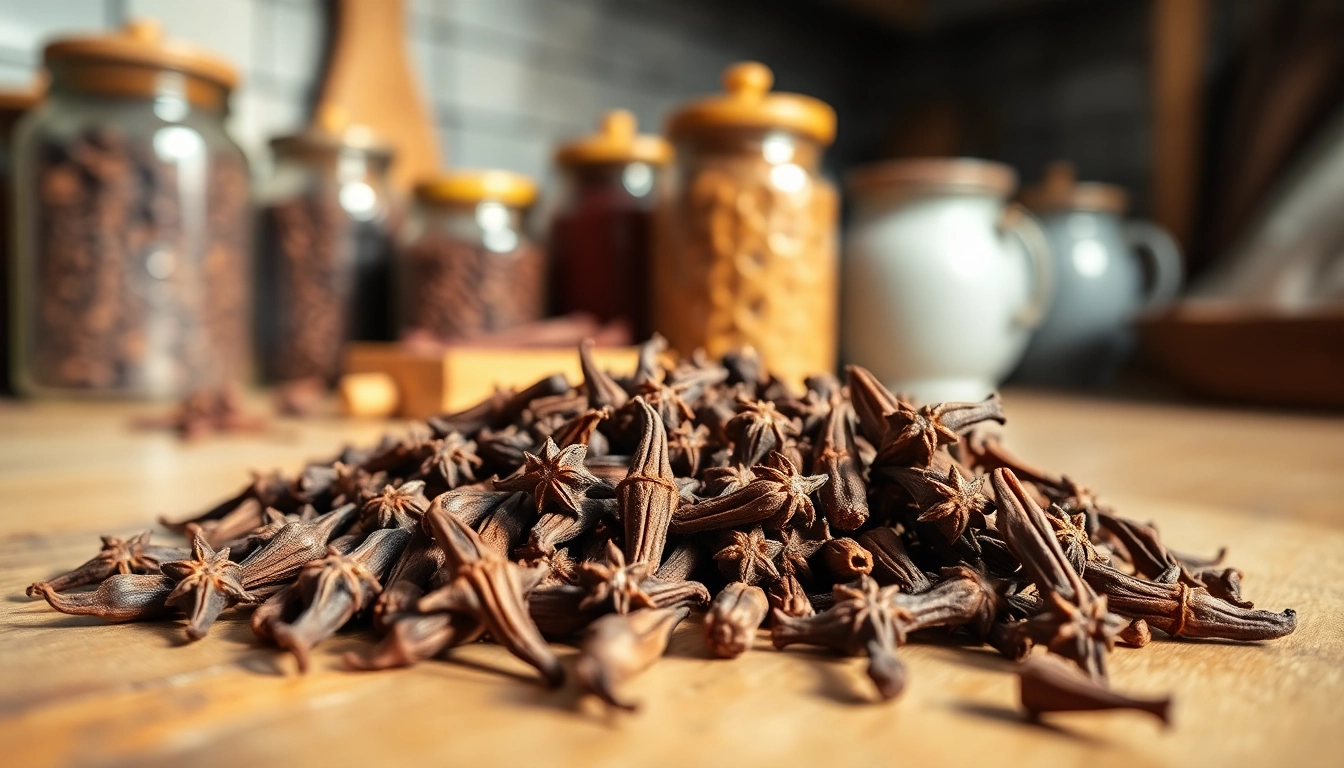Introduction to Cloves: More Than Just a Spice
Cloves, the aromatic flower buds of the Syzygium aromaticum tree, have captivated the culinary and medicinal worlds for centuries. Native to the Maluku Islands in Indonesia, these small, reddish-brown flower buds are celebrated not only for their unique flavor but also for their potential health benefits. Today, they are widely used in cooking, baking, and various consumer products, including toothpaste and cosmetics. This article aims to delve into the diverse uses, health benefits, and culinary applications of cloves, showcasing why they deserve a spot in every kitchen and natural remedy cabinet.
The Botanical Background of Cloves
Cloves are derived from the flower buds of the clove tree, which belongs to the Myrtaceae family. This evergreen tree can grow up to 20 meters tall and thrives in tropical climates. Clove buds are harvested just before they bloom, maintaining their essential oil content and aromatic qualities. After picking, the buds are dried in the sun until they darken in color and develop their characteristic scent, which is rich and warm, hinting at their nutrient density.
Culinary Uses of Cloves
In culinary practices, cloves bring a warm, sweet, and slightly bitter flavor profile that enhances a variety of dishes. They are staples in numerous cuisines worldwide, particularly in Indian and Middle Eastern cooking.
- Savory Dishes: Cloves are often included in spice blends like garam masala and are utilized in braises, stews, and marinades to add depth to rich flavors.
- Baking: From gingerbread cookies to pumpkin pies, cloves lend their distinctive flavor to a range of desserts, making holidays more festive.
- Beverages: Cloves can be infused in teas, mulled wines, and spiced ciders, imparting a comforting aroma that enhances the drinking experience.
Cloves in Natural Remedies
The use of cloves extends beyond the culinary realm; they have a long history in traditional medicine. Their natural antibacterial and anti-inflammatory properties make them a popular choice for home remedies. Clove oil, derived from the buds and used in essential oil form, is often recommended for toothaches, thanks to its eugenol content, which has analgesic properties.
Health Benefits of Cloves: What Science Says
Research has begun to substantiate many of the health claims associated with cloves. Below, we explore the scientifically backed benefits and the nutrients they contain.
Antioxidant Properties of Cloves
Cloves are loaded with antioxidants, which help combat oxidative stress in the body. The essential oils in cloves, especially eugenol, have shown significant antioxidant activity, which can help protect the body from free radicals that contribute to chronic diseases.
Numerous studies underscore the potent antioxidant properties of cloves. For instance, a research article in the journal Food Chemistry found that clove extracts exhibited the highest antioxidant activity among several spices tested, making them a powerhouse for health when consumed regularly.
Cloves and Digestive Health
The compounds in cloves can aid in digestion by promoting gastric secretions that enhance enzyme activity, thereby improving nutrient absorption. Cloves are often used in traditional medicines to relieve digestive discomforts like bloating and gas. Additionally, their antimicrobial properties may help manage gut bacteria, supporting a healthy digestive environment.
Incorporating cloves into meals, such as adding them to stews or banana bread, can be a flavorful way to support digestive health naturally.
Potential Effects on Blood Sugar Levels
Emerging research indicates that cloves may help regulate blood sugar levels, making them beneficial for individuals with diabetes. The eugenol in cloves is thought to improve insulin sensitivity, aiding in blood sugar control.
A study published in the journal Diabetes Research and Clinical Practice highlighted that clove extract could reduce blood sugar levels significantly in diabetic rats, marking a positive potential for further research in human applications.
Incorporating Cloves into Your Diet
Adding cloves to your diet doesn’t have to be complicated. Here are some creative ways to infuse this spice into your daily meals.
Creative Culinary Recipes with Cloves
Experimenting with cloves in the kitchen can open up a realm of flavors. Here are a few recipe ideas:
- Clove-Infused Rice: Add whole cloves to cooking water for rice to give it a subtle flavor.
- Spiced Apple Cider: Simmer apple cider with cloves, cinnamon sticks, and slices of orange for a warming drink.
- Clove-Seasoned Roasted Vegetables: Coat vegetables with olive oil, salt, pepper, and crushed cloves before roasting for an aromatic twist.
Making Clove Infused Oil
Clove-infused oil can be an excellent addition to your oil repertoire. To make it, simply combine a neutral oil (like olive or grapeseed) with crushed cloves in a jar. Let the mixture sit in a warm, dark place for two weeks, shaking gently every few days. Strain the oil and use it for cooking or as a flavor enhancer in dressings.
Using Cloves in Daily Beverages
Cloves can be easily incorporated into various beverages. Here are some popular options:
- Clove Tea: Steep cloves in boiling water for a spicy, aromatic tea. Optionally, add honey for sweetness.
- Clove Water: Soak a few whole cloves in water overnight, and sip on it the next day to harness detoxifying benefits.
Precautions and Considerations When Using Cloves
While cloves have numerous benefits, it is essential to use them wisely. Here are several precautions to keep in mind.
Who Should Avoid Cloves?
Certain individuals should avoid excessive consumption of cloves, particularly those with bleeding disorders, pregnant women, and people undergoing surgery. Cloves can influence blood clotting and may interact with medications that affect blood sugar levels, so it’s wise to consult a healthcare provider before significant dietary changes or herbal supplementation.
Side Effects of Overconsumption
While moderate consumption of cloves is safe for most, overconsumption can lead to gastrointestinal issues, such as stomach upset or irritation. It’s recommended to limit clove oil and clove extracts, as they are much more concentrated than whole or ground cloves.
Interactions with Medications
Cloves can interfere with certain medications, including blood thinners like warfarin and diabetes medications. Users must seek medical advice if they are currently on medications and wish to incorporate a high volume of cloves into their diet.
Conclusion: Embracing Cloves in Everyday Life
Summarizing the Benefits of Cloves
Cloves stand out as a spice with a rich history and numerous culinary and health applications. Their culinary richness brings warmth and complexity to dishes, while their health benefits—including antioxidant properties, digestive aid, and potential blood sugar regulation—enhance overall wellness.
Final Thoughts on Clove Usage
Incorporating cloves into your cooking and health practices can be both enjoyable and beneficial. Whether through aromatic teas, as part of savory dishes, or in health remedies, cloves offer a versatile approach to enhancing flavor and wellness.
Encouraging Experimentation with Cloves
As you explore the wonders of cloves, don’t hesitate to experiment. Try adding them to new recipes or using them in traditional ways to discover how this remarkable spice can elevate your meals and wellness practices.



